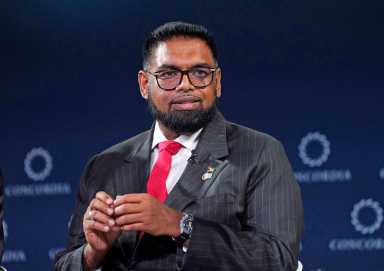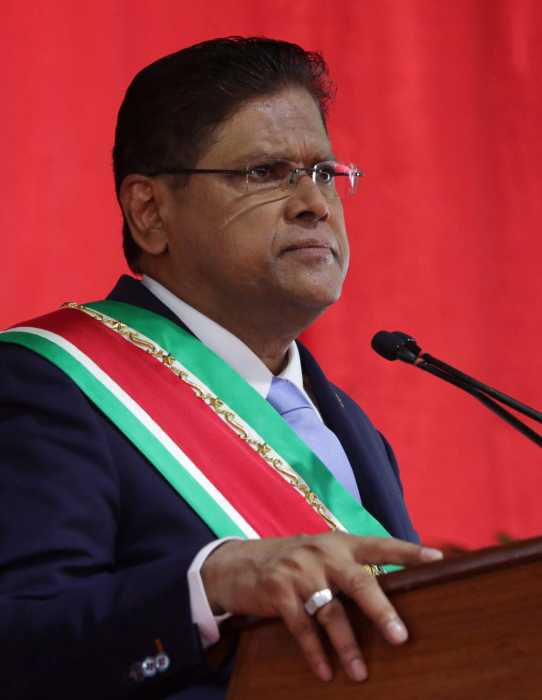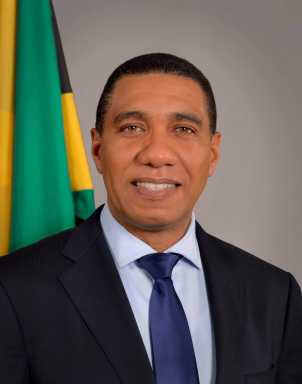Listeners:
Top listeners:
-
play_arrow
RadioJLR Just Press Play

While electoral officials were frantically counting votes from general elections in Suriname on Sunday, the head of state in neighboring Guyana announced Monday, Sept. 1, as the date for general elections 2025.
President Irfaan Ali, speaking late Sunday during 59th independence anniversary celebrations, unveiled the date and announced plans to dissolve parliament, setting the stage for what is likely to be one of the most consequential elections since independence in 1966.
His announcement means that the region’s largest and most resource-rich nation will be the latest in a string of polls in the 15-nation bloc this year. At least six such elections have been held so far this year, while those in Guyana, Jamaica, and St. Vincent are still to be run.
As the major opposition parties will be forced to organize a joint slate and agree on a consensus candidate to take on an incumbent raking in more than $8 million daily from offshore oil revenues, Surinamese voters were awaiting the final count from what was also one of the most important elections since independence from The Netherlands in 1975.
Preliminary results so far indicate that the National Democratic Party (NDP) of late military strongman Desi Bouterse has secured 18 seats, two more than it had in 2020, while the Hindustani-dominated VHP party of President Chan Santokhi has so far tallied 17 seats, three less than in 2020 and meaning a loss of about 150,000 votes. Parties need a majority of 26 seats to form a government and 34, or two-thirds, to elect a president.

Leaders of all the major parties, including the middle class-supported National Party of Suriname (NPS) with six seats from three last time, say they are ready to discuss coalition formation.
The Dutch-speaking CARICOM nation has a history of coalition governments. The last one had four parties: one representing Indo and Afro Surinamese, one traditionally supported by the urban middle class, and the fourth Maroons, descendants of runaway slaves in the colonial era. Two had abandoned the grouping before the elections, citing rampant and widespread corruption, nepotism, rising inflation, and other problems.
As electoral officials prepare for the final tally, leaders of the NDP and the VHP have begun to signal a willingness to talk coalition formation as much is at stake. In early 2028, Suriname will begin production of offshore oil that will likely bring in billions to the country of just over 600,000 from the prolific Guyana-Suriname basin.
Neighboring Guyana, for example, earns nearly $9 million daily from oil production. This is expected to almost double with additional oil fields coming on stream in about two years, taking production to one million barrels from around 650,000 daily.
“We asked for a mandate, and this is the mandate that the people have given. We must now continue with this. It is up to us to have discussions with other political parties on this basis. The election campaign is over; the battle has been fought. Now, we as leaders have to see what is good for the country. That is what it is all about now,” Santokhi told reporters.
For its part, the NDP, which lost the 2020 elections to a VHP-led grouping, says no administration will run the country with it on the political and governmental sidelines this time.
The NDP had had two terms in office from 2010, but leader Jenny Geerlings-Simons says the party is happy with its progress even though 18 seats represent a gain of just two seats from 2020, while the VHP has dropped three or just over 15,000 votes.
She says party leadership is already working on what happens in the coming days, meaning coalition formation. If all goes well, Geerlings-Simons could become the country’s first head of government when electing a leader begins in earnest in the coming days. If she does, she will join Mia Mottley of Barbados, Kamla Persad-Bissessar of Trinidad, and Cora Richardson-Hodge of Anguilla, all attorneys at law.
“We are on the right track. There are still a few thousand votes to be counted, and we hope that it will continue in our favor, but we will calmly wait for the result. We are happy because we know how this result came about. But we are where we are now and will continue from there. This is the first step – and believe me, we are already working on it,” said the NDP leader and former parliamentary speaker.
Meanwhile, in Guyana, like Suriname, whichever party runs the government after September will enjoy billions in oil revenues going forward, as less than 10 % of the prolific basin has been explored.
Written by: Adm
Similar posts
© 2025. All Rights Reserved by Radio-JLR


